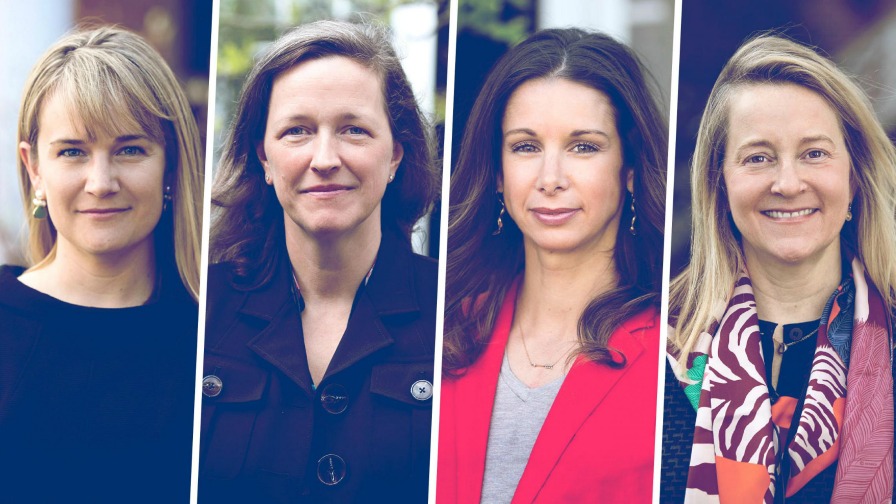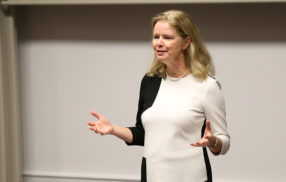
Four Darden Alumnae on Female Leadership in Private Equity
By Caroline Newman
The glass ceiling in private equity has begun showing a few cracks.
Private equity firms, which invest in growing companies that are not yet publicly traded, have traditionally struggled with a lack of women in leadership positions. A 2016 study by professional services firm KPMG reported that 79 percent of industry professionals believe it is harder for women to succeed in private equity.
However, female graduates of the University of Virginia Darden School of Business working in the upper echelons of private equity firms report that the gender imbalance is slowly changing.
“Over the years, my firm and I myself have been successful in hiring and promoting women. Now, my team actually has more women than men in leadership positions,” said Peggy Roberts (MBA ’01), the chief operating officer of the Riverside Capital Appreciation Fund. “Once you have one woman in a partner position, it becomes easier to attract more female talent, and I think that diversity has been a tremendous asset for us.”
Roberts and five fellow female alumni returned to Darden last week for the annual Darden Private Equity Conference, sponsored by the student Private Equity Club. They joined 11 other speakers for a two-day slate of panels and networking events.
Prior to the conference, UVA Today spoke with four of the women: Roberts, who oversees the investment team for her fund, and leads fundraising, hiring and promotions; Lisa Parks (MBA ’07), a managing director and partner at Envest Capital Partners with an investment portfolio including industries from health care to manufacturing; Kristin Gunther (MBA ’09), a vice president at Revolution Growth who invests in business ventures valued above $25 million; and Courtney McCarthy (MBA ’94), who recently started her own firm, CMC Strategic Investor Relations.
Each reflected on her career so far and what it is like to be a woman working in private equity.
On What They Enjoy Most About Their Work
All four women said that they enjoy the variety of their work, which connects them to many different companies in a wide range of industries.
“Private equity is a really interesting space, because you are looking at a lot of different companies and thinking about how to grow them and make them more competitive,” said Roberts, who often works with small or family-run businesses. “Intellectually, it is very stimulating.”
Parks agreed. “One day I might learn about manufacturing plants; the next day I might be working with a wellness company setting up clinics inside corporate headquarters,” she said.
Or, as Gunther put it, “You never have the same day twice.”
On Being A Woman in Private Equity
Though they acknowledged that the industry is male-dominated, none of the four women felt limited by a glass ceiling.
“I would define it as an evolution more than a glass ceiling,” Roberts said. “Attitudes toward promoting women are changing and more women are going for those leadership positions.”
Roberts and McCarthy said that the investors who put their money in private equity have increasingly emphasized diversity.
“Our clients and investors have a lot of women in leadership,” Roberts said. “They want to see female leadership within the private equity firm.”
McCarthy pointed out that investors emphasize diversity not because it is politically correct, but because it is the best business decision.
“Investors are putting their money into something for 10 years or more, and they want diversity of thought,” she said. “We know from research that firms tend to perform better, particularly in times of high volatility, when there is diversity of perspective.”
Gunther also cautioned that widespread change could come slowly.
“The industry is still male-dominated,” she said. “Women can be perceived differently and have to be very self-aware.”
On Advice for Rising Leaders
The women recommended that rising leaders carefully choose the culture of the firm they join, looking at how the firm treats its employees, the amount of autonomy and flexibility allowed and prospects for promotion and advancement.
Parks also emphasized a different type of flexibility – the willingness to take risk or change roles when opportunity arises.
“When I was first approached about private equity, I wondered if I was qualified, because I had not worked in private equity before,” she said. “Thinking out of the box, and exploring new roles and industries when you are younger can open up opportunities.”
Gunther said persistence is critical.
“You have to be very persistent, because this is a challenging industry to get into,” she said. “Because you do so many different things and work with different industries, you also need to be willing and able to expand your skill set. Darden really helped me with that.”
Finally, McCarthy said that those just starting out should not be intimidated by an industry’s reputation.
“When I started out in investment banking, people told me I would not like it because I was too nice. That fed my drive even more,” she said. “Don’t shy away from an industry just because of its perceived problems. You could be a part of the solution.”
This story originally appeared on UVA Today.
The University of Virginia Darden School of Business prepares responsible global leaders through unparalleled transformational learning experiences. Darden’s graduate degree programs (MBA, MSBA and Ph.D.) and Executive Education & Lifelong Learning programs offered by the Darden School Foundation set the stage for a lifetime of career advancement and impact. Darden’s top-ranked faculty, renowned for teaching excellence, inspires and shapes modern business leadership worldwide through research, thought leadership and business publishing. Darden has Grounds in Charlottesville, Virginia, and the Washington, D.C., area and a global community that includes 18,000 alumni in 90 countries. Darden was established in 1955 at the University of Virginia, a top public university founded by Thomas Jefferson in 1819 in Charlottesville, Virginia.
Press Contact
Molly Mitchell
Senior Associate Director, Editorial and Media Relations
Darden School of Business
University of Virginia
MitchellM@darden.virginia.edu






